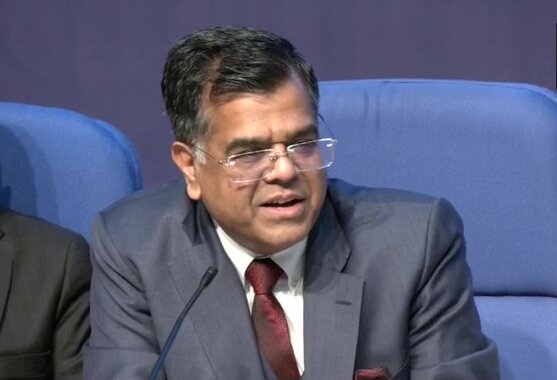
High capex is right recipe in uncertain world: Finance Secy Somanathan

Wiser after the unexpected shocks like the Ukraine-Russia war and Covid-19 pandemic, the Modi government has turned fiscal discipline as insurance against any adverse impact on the economy. To be prepared for any shock is the lesson learnt due to recent adversities, Finance Secretary Dr. TV Somanathan explained in an exclusive interaction with The Federal.
High capital expenditure to rev up economic growth combined with lower deficit to ensure macro-economic stability is the primary foundation of the Budget 2023-24, Dr. Somanathan emphasised. India has remained a bright star in the global economy and care has been taken to sustain this outperformance, he stressed.
According to the Finance Secretary, the three main goals of the budget are to ensure growth at a rapid pace, maintain deficits under control, and provide special initiatives for those who may not automatically benefit from the growth of the economy. Dr. Somanathan is a key member of the team of finance ministry officials that shaped the fifth budget of Finance Minister Nirmala Sitharaman.
Opinion: Budget will boost growth, provided budgeted capex materialises
He pointed out that the Union government has targeted a lower fiscal deficit of 5.9% in 2023-24 as compared to the 6.4% target for 2022-23 despite a steep hike in allocation for capex. This has been done by keeping revenue expenditure under a tight leash, Dr. Somanathan explained.
‘When we sat here last year, Ukraine had not happened’
Speaking to The Federal at his North Block office in Delhi, he said sustaining high growth in the economy by hiking capital expenditure is what “we see as the most appropriate measure for the times” – hinting at the importance of avoiding the high inflation raging through most parts of the world.
“We live in an uncertain world and we have to be prepared for unexpected events,” he added.
Dr. Somanathan expressed the opinion that “certain amount of caution is required” while presenting a budget. “One cannot always assume that the best will happen,” he commented on the emphasis placed in the budget for fiscal prudence. Budget arithmetic has to be prepared keeping in mind the possibility of adverse events, he said.
‘No adverse impact on institutions due to Adani’
Public sector financial institutions and banks do not face adverse impacts due to the ongoing slide in Adani Group shares, Dr. Somanathan explained.
Also read: Budget 2023-24: Centre hurtles along infra track with 33% capex hike
He also remarked that the government does not monitor, watch or take action on matters pertaining to any individual private company as there are specific institutions to deal with such cases.
“As regards public finance institutions or banks, all I can say is that their exposure to any one entity is so small that it will not have any impact on the stability of these institutions in which the public has placed their confidence and there is absolutely no adverse impact on these institutions,” he said, sending out a message that public money is not under risk.
The opposition has been paralysing both Houses of Parliament, stressing its demand for a Joint Parliamentary Committee (JPC) probe into the Adani Group issue. Shares of Adani Group companies have been sliding downhill after US-based Hindenburg levelled allegations of malpractices like share price rigging. While the ambitious FPO of Adani Enterprises has been called off, opposition parties like the Congress, DMK and TMC have been demanding a detailed discussion on the issue in both houses of Parliament, pushing the Budget session into turmoil after the President’s address and the Budget. Discussion on the motion of thanks to the President’s address has not even started though the session is in its second week now.
Also read: Why Chidambaram thinks a home loan can be part of a savings plan
Dr. Somanathan exuded confidence that the 2023-34 disinvestment target of ₹51,000 crore will be met.
“We expect the estimates that we have presented in the Budget to be realised,” he said with confidence.
High growth with low risk
The Finance Secretary said the Budget was aimed at “sustaining high rate” of economic growth – alluding to the recent projections of the International Monetary Fund (IMF) that India will achieve the fastest growth among the large economies of the world next year too. FM Sitharaman also mentioned in Parliament that India remained a bright star in the world when it comes to economic growth.
Dr. Somanathan said the effort through the budget was to ensure high growth – even if economic growth is affected in other parts of the world. “In the coming year, regardless of the possible negative impact on economies outside, it is our intention to keep growth as high as possible,” he explained the primary philosophy behind the Budget.
Also read: Budget 2023-24: Good for small taxpayers, not for HNIs
On the popular expectation about an “election budget” being delivered, he quipped in a lighter vein: “You have to ask my superiors.”
In view of the nine Assembly elections this year and the Lok Sabha election next year, a populist budget with a bouquet of freebies was anticipated, but the Modi government has decided to stick to economic growth as the route to prosperity for people.
Borrowing will be kept under tight control to ensure that macroeconomic stability is not disturbed, Dr. Somanathan pointed out. “It is important that we keep our fiscal efforts in a prudent manner so that there is no excess of borrowing affecting future generations of citizens or governments.”
Dr. Somanathan mentioned that there are certain vulnerable sections that do not automatically benefit from economic growth. That is the reason behind the incentive schemes and announcements for tribal societies and similar disadvantaged sections.
“We are aware that market economy may leave many people behind,” he said explaining the PM-VIKAS scheme for artisans and craftspeople.


